Text
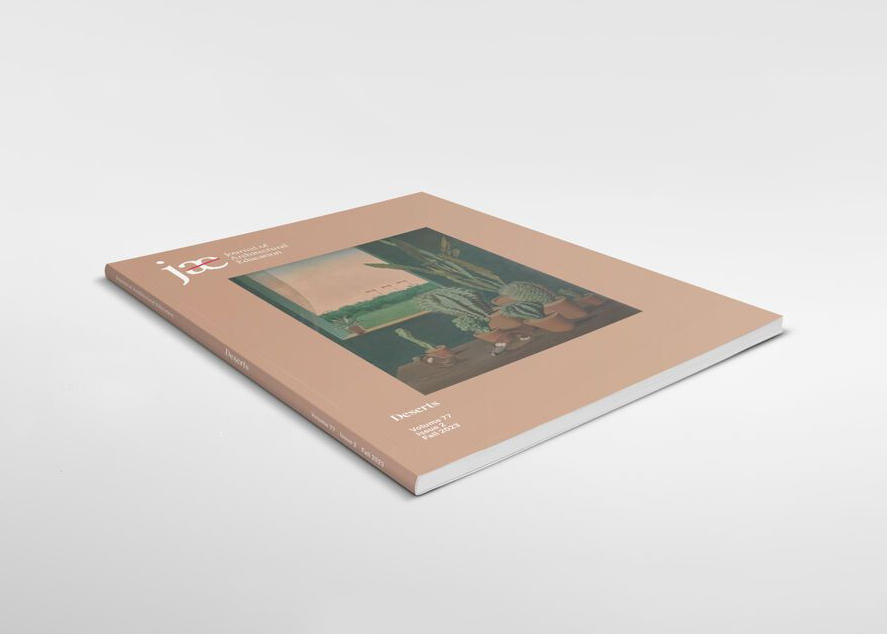
Deserts
2023
Journal of Architecture Education
This issue of the Journal of Architectural Education explores the desert environment in its geopolitical, infrastructural, and aesthetic dimensions, acknowledging that deserts continue to transform architectural imagination and collective intelligence.
The word desert—from the Latin desertum, left, abandoned, and withdrawn—has been exploited for centuries as a reductionist trope to evoke desolate ecosystems where hostile climatic circumstances and extreme temperatures prevent life from thriving. Eurocentric and Western perspectives especially have mischaracterised deserts as precarious and dangerous wastelands, often connoted with mystical, exotic, and sublime dimensions, enabling violent occupations, extractive campaigns, and colonialist expansions. Centuries of environmental racism have extracted, excluded, and exploited desert territories and desert communities, exacerbating conflicts across the most contested regions of the planet to this day.
Editors
Ersela Kripa, Francesco Marullo & Stephen Mueller
Contributors
Ivan L. Munuera, Dalal Musaed Alsayer, Faysal Tabbarah, Aseel AlYaqoub, Yousef Awaad Hussein, Asaiel Al Saeed, Saphiya Abu Al-Maati, Ezgi İşbilen, Tamar Zinguer, Tamar Zinguer, Gabrielle Printz, Montserrat Bonvehi Rosich, Seth Denizen, Dante Furioso, Patty Heyda, Julien Lafontaine Carboni, Piper Bernbaum & Zach Colbert, Danika Cooper, Alvaro Velasco Perez, Brendan O’Neill, Samantha L. Martin, Margaret Freeman.
Website: www.jaeonline.org/issue-article/deserts/
2023
Journal of Architecture Education
This issue of the Journal of Architectural Education explores the desert environment in its geopolitical, infrastructural, and aesthetic dimensions, acknowledging that deserts continue to transform architectural imagination and collective intelligence.
The word desert—from the Latin desertum, left, abandoned, and withdrawn—has been exploited for centuries as a reductionist trope to evoke desolate ecosystems where hostile climatic circumstances and extreme temperatures prevent life from thriving. Eurocentric and Western perspectives especially have mischaracterised deserts as precarious and dangerous wastelands, often connoted with mystical, exotic, and sublime dimensions, enabling violent occupations, extractive campaigns, and colonialist expansions. Centuries of environmental racism have extracted, excluded, and exploited desert territories and desert communities, exacerbating conflicts across the most contested regions of the planet to this day.
Editors
Ersela Kripa, Francesco Marullo & Stephen Mueller
Contributors
Ivan L. Munuera, Dalal Musaed Alsayer, Faysal Tabbarah, Aseel AlYaqoub, Yousef Awaad Hussein, Asaiel Al Saeed, Saphiya Abu Al-Maati, Ezgi İşbilen, Tamar Zinguer, Tamar Zinguer, Gabrielle Printz, Montserrat Bonvehi Rosich, Seth Denizen, Dante Furioso, Patty Heyda, Julien Lafontaine Carboni, Piper Bernbaum & Zach Colbert, Danika Cooper, Alvaro Velasco Perez, Brendan O’Neill, Samantha L. Martin, Margaret Freeman.
Website: www.jaeonline.org/issue-article/deserts/

Architecture of the Territory: Constructing National Narratives in the Arab World
2022
Kaph Books
Architecture of the Territory examines the role that national narratives have in defining the Arab world through the use of architecture and urban planning. The book is a collection of 30 essays from various countries in the Arab world.
This territory, almost twice the size of the United States and home to 423,000,000 inhabitants lacks sufficient and accessible research. To advance knowledge and critical thinking, this publication uncovers some mechanisms and narratives that have shaped the territory and its society. The selected essays, written by researchers and professionals, begin a dialogue, touching on themes such as agricultural strategies, imported housing typologies, the issues inherited from colonial borders, and the effect of politics on infrastructure projects and cultural heritage. While critical contributions draw on local histories and context, they also run in parallel and contribute to the discourse on current global issues.
Editor
Collective For Architecture
Contributors
Ahmad AlAqra, Ali Karimi, Asaiel Al Saeed, Aseel AlYaqoub, Atef Alshehri, Balsam Madi, Ben Tosland, Carine Assaf, Christine Mady, Dena Qaddumi, Eleftheria Exarchou, Faysal Tabbarah, Francois Nour, Galila Elkadi, Hamed Bukhamseen, Hanadi Samhan, Hareth Ramzi, Hicham Bouzid, Inass Yassin, Ines Tazi, Jumanah Abbas, Mahdi Sabbagh, Mahmud Tantoush, Majd Murad, Mazen Haidar, Mina Akhavan, Noor Toshani, Nour Joudah, Omniya Abdel Barr, Pieter Van den Broek, Rana Beiruti, Rand Abdul Jabbar, Saphiya Abu Al-Maati, Sawsan Abou Zainedin, Yasmin Huleileh, Yasmine Kherfi.
Website: https://www.kaphbooks.com/books/architecture-territory-constructing-national-narratives-arab-world/
2022
Kaph Books
Architecture of the Territory examines the role that national narratives have in defining the Arab world through the use of architecture and urban planning. The book is a collection of 30 essays from various countries in the Arab world.
This territory, almost twice the size of the United States and home to 423,000,000 inhabitants lacks sufficient and accessible research. To advance knowledge and critical thinking, this publication uncovers some mechanisms and narratives that have shaped the territory and its society. The selected essays, written by researchers and professionals, begin a dialogue, touching on themes such as agricultural strategies, imported housing typologies, the issues inherited from colonial borders, and the effect of politics on infrastructure projects and cultural heritage. While critical contributions draw on local histories and context, they also run in parallel and contribute to the discourse on current global issues.
Editor
Collective For Architecture
Contributors
Ahmad AlAqra, Ali Karimi, Asaiel Al Saeed, Aseel AlYaqoub, Atef Alshehri, Balsam Madi, Ben Tosland, Carine Assaf, Christine Mady, Dena Qaddumi, Eleftheria Exarchou, Faysal Tabbarah, Francois Nour, Galila Elkadi, Hamed Bukhamseen, Hanadi Samhan, Hareth Ramzi, Hicham Bouzid, Inass Yassin, Ines Tazi, Jumanah Abbas, Mahdi Sabbagh, Mahmud Tantoush, Majd Murad, Mazen Haidar, Mina Akhavan, Noor Toshani, Nour Joudah, Omniya Abdel Barr, Pieter Van den Broek, Rana Beiruti, Rand Abdul Jabbar, Saphiya Abu Al-Maati, Sawsan Abou Zainedin, Yasmin Huleileh, Yasmine Kherfi.
Website: https://www.kaphbooks.com/books/architecture-territory-constructing-national-narratives-arab-world/

Deserts Are Not Empty
Interview: Space War - An Investigation Into Kuwait’s Hinterland
2022
Columbia University Press
Colonial and imperial powers have often portrayed arid lands as “empty” spaces ready to be occupied, exploited, extracted, and polluted. Despite the undeniable presence of human and nonhuman lives and forces in desert territories, the “regime of emptiness” has thus inhabited, and is still inhabiting, many imaginaries. Deserts Are Not Empty challenges this colonial tendency, questions its roots and ramifications and remaps the representations, theories, histories, and stories of arid lands, comprising approximately one-third of the Earth’s land surface. The volume combines poems in original languages, conversations with collectives, and essays by scholars and professionals from architecture, architectural history and theory, curatorial studies, comparative literature, film studies, landscape architecture, and photography. These different approaches and diverse voices draw on a framework of decoloniality to unsettle and unlearn the desert, opening up possibilities to see, think, and imagine it otherwise.
Editor
Samia Henni
Contributors
Saphiya Abu Al-Maati, Menna Agha, Asaiel Al Saeed, Aseel AlYaqoub, Yousef Awaad Hussein, Ariella Aïsha Azoulay, Danika Cooper, Brahim El Guabli, Timothy Hyde, Jill Jarvis, Bongani Kona, Dalal Musaed Alsayer, Observatoire des armements, Francisco E. Robles, Paulo Tavares, Alla Vronskaya, and XqSu.
Website: www.arch.columbia.edu/books/catalog/998-deserts-are-not-empty
Interview: Space War - An Investigation Into Kuwait’s Hinterland
2022
Columbia University Press
Colonial and imperial powers have often portrayed arid lands as “empty” spaces ready to be occupied, exploited, extracted, and polluted. Despite the undeniable presence of human and nonhuman lives and forces in desert territories, the “regime of emptiness” has thus inhabited, and is still inhabiting, many imaginaries. Deserts Are Not Empty challenges this colonial tendency, questions its roots and ramifications and remaps the representations, theories, histories, and stories of arid lands, comprising approximately one-third of the Earth’s land surface. The volume combines poems in original languages, conversations with collectives, and essays by scholars and professionals from architecture, architectural history and theory, curatorial studies, comparative literature, film studies, landscape architecture, and photography. These different approaches and diverse voices draw on a framework of decoloniality to unsettle and unlearn the desert, opening up possibilities to see, think, and imagine it otherwise.
Editor
Samia Henni
Contributors
Saphiya Abu Al-Maati, Menna Agha, Asaiel Al Saeed, Aseel AlYaqoub, Yousef Awaad Hussein, Ariella Aïsha Azoulay, Danika Cooper, Brahim El Guabli, Timothy Hyde, Jill Jarvis, Bongani Kona, Dalal Musaed Alsayer, Observatoire des armements, Francisco E. Robles, Paulo Tavares, Alla Vronskaya, and XqSu.
Website: www.arch.columbia.edu/books/catalog/998-deserts-are-not-empty
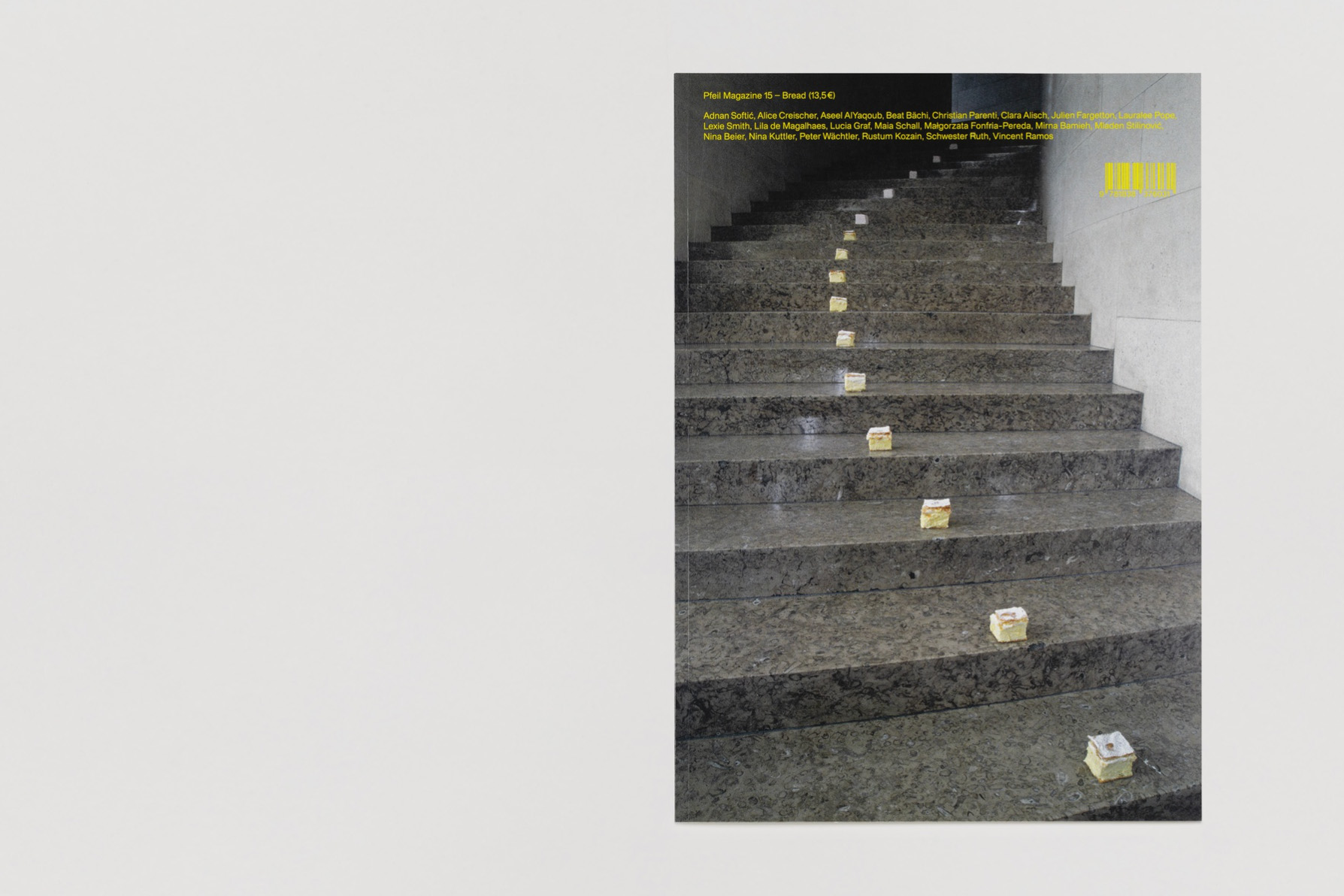
Pfeil Magazine 15 - Bread
He Who Makes My Bread Is Not My Enemy
2022
Montez Press
From its seeds to its crumbs, this issue focuses on the meaning of bread. One of the oldest human-made staples, rooted in the dawn of agriculture and the settling of land, its ingredients unite and divide, creating winners and losers. We deal with madness and explosives, coincidences and intoxication, distribution and possession—and cake.
Within the magazine format, each page of Pfeil represents the floor, walls, or ceiling, creating an imagined room displaying a printed exhibition. Each issue is dedicated to a specific word, with artists invited and given space to work on and with this term and to construct or deconstruct the architecture around it. Combined, the contributions transform into an organic display surrounding the leitmotif.
Editors
Anja Dietmann, Julia Lerch Zajączkowska
Contributors
Adnan Softić, Alice Creischer, Aseel AlYaqoub, Beat Bächi, Christian Parenti, Clara Alisch, Julien Fargetton, Lauralee Pope, Lexie Smith, Lila de Magalhaes, Lucia Graf, Maia Schall, Małgorzata Fonfria-Pereda, Mirna Bamieh, Mladen Stilinović, Nina Beier, Nina Kuttler, Peter Wächtler, Rustum Kozain, Schwester Ruth, Vincent Ramos.
Wesbite: www.montezpress.com/catalogue/pfeil/bread/
He Who Makes My Bread Is Not My Enemy
2022
Montez Press
From its seeds to its crumbs, this issue focuses on the meaning of bread. One of the oldest human-made staples, rooted in the dawn of agriculture and the settling of land, its ingredients unite and divide, creating winners and losers. We deal with madness and explosives, coincidences and intoxication, distribution and possession—and cake.
Within the magazine format, each page of Pfeil represents the floor, walls, or ceiling, creating an imagined room displaying a printed exhibition. Each issue is dedicated to a specific word, with artists invited and given space to work on and with this term and to construct or deconstruct the architecture around it. Combined, the contributions transform into an organic display surrounding the leitmotif.
Editors
Anja Dietmann, Julia Lerch Zajączkowska
Contributors
Adnan Softić, Alice Creischer, Aseel AlYaqoub, Beat Bächi, Christian Parenti, Clara Alisch, Julien Fargetton, Lauralee Pope, Lexie Smith, Lila de Magalhaes, Lucia Graf, Maia Schall, Małgorzata Fonfria-Pereda, Mirna Bamieh, Mladen Stilinović, Nina Beier, Nina Kuttler, Peter Wächtler, Rustum Kozain, Schwester Ruth, Vincent Ramos.
Wesbite: www.montezpress.com/catalogue/pfeil/bread/
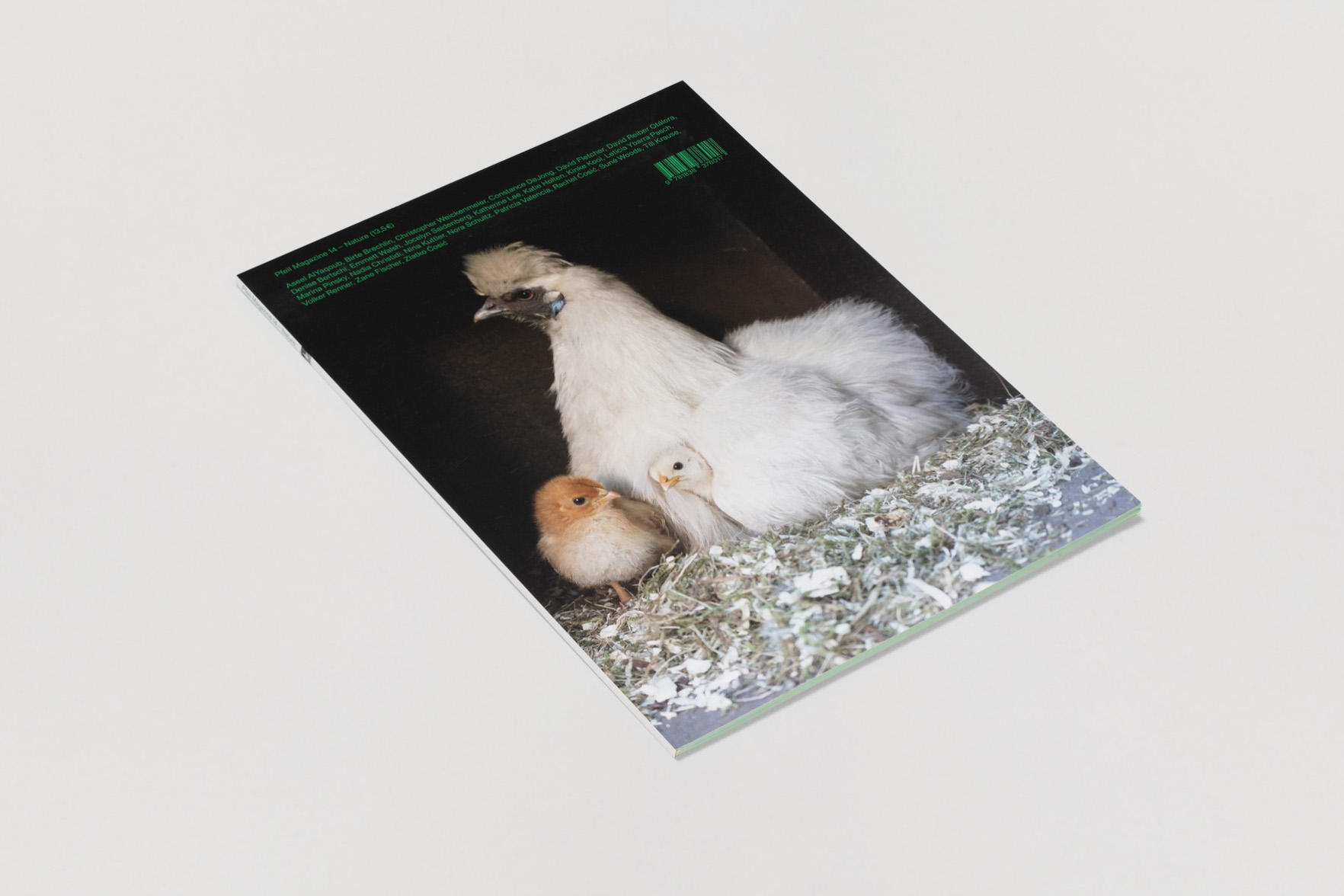
Pfeil Magazine 14 - Nature
Mimic Men
2021
Montez Press
Deriving from the Old French nature (being, the principle of life; character, essence), in turn stemming from the Latin word natura (course of things; natural character, constitution, quality; the universe), this issue revisits the term Nature once again, with all its direct and indirect meanings. In times of global warming and the urgent necessity for active change, we deal with the effects of cultural mimicry, the language of trees, artificial yolk dye, how natural resources can change in their worth and meaning, and question how the theory of evolution would have manifested under a female lens in the 19th century.
Editor
Anja Dietmann
Contributors
Aseel AlYaqoub, Birte Brechlin, Christopher Weickenmeier, Constance DeJong, David Fletcher, David Reiber Otálora, Denise Bertschi, Emmett Walsh, Jocelyn Saidenberg, Katherine Lee, Katie Holten, Kinke Kooi, Leticia Ybarra Pasch, Marina Pinsky, Nadia Christidi, Nina Kuttler, Nora Schultz, Patricia Valencia, Rachel Ćosić, Suné Woods, Till Krause, Volker Renner, Zane Fischer, Zlatko Ćosić.
Website: www.montezpress.com/catalogue/pfeil/nature/
Mimic Men
2021
Montez Press
Deriving from the Old French nature (being, the principle of life; character, essence), in turn stemming from the Latin word natura (course of things; natural character, constitution, quality; the universe), this issue revisits the term Nature once again, with all its direct and indirect meanings. In times of global warming and the urgent necessity for active change, we deal with the effects of cultural mimicry, the language of trees, artificial yolk dye, how natural resources can change in their worth and meaning, and question how the theory of evolution would have manifested under a female lens in the 19th century.
Editor
Anja Dietmann
Contributors
Aseel AlYaqoub, Birte Brechlin, Christopher Weickenmeier, Constance DeJong, David Fletcher, David Reiber Otálora, Denise Bertschi, Emmett Walsh, Jocelyn Saidenberg, Katherine Lee, Katie Holten, Kinke Kooi, Leticia Ybarra Pasch, Marina Pinsky, Nadia Christidi, Nina Kuttler, Nora Schultz, Patricia Valencia, Rachel Ćosić, Suné Woods, Till Krause, Volker Renner, Zane Fischer, Zlatko Ćosić.
Website: www.montezpress.com/catalogue/pfeil/nature/
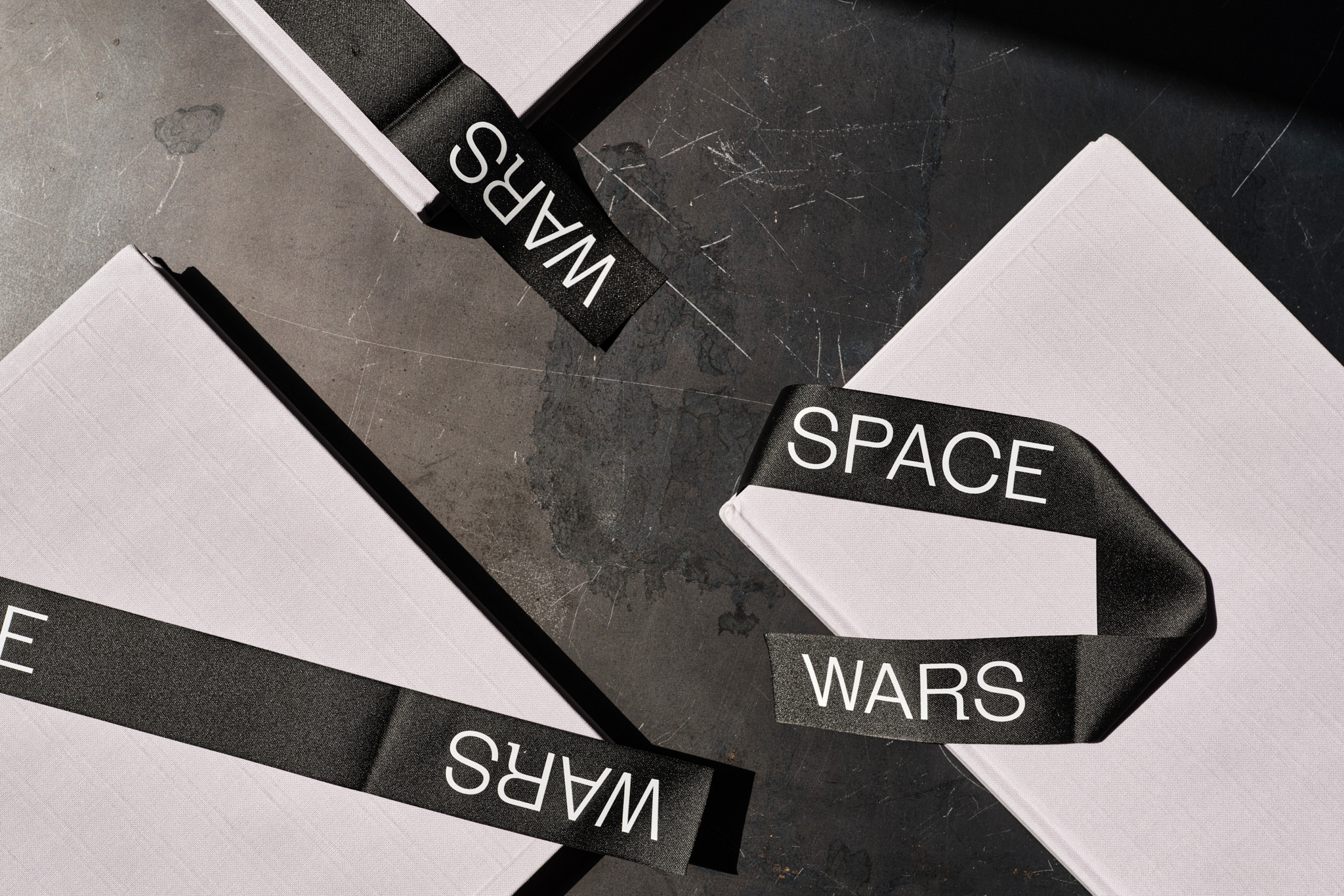
Space Wars
Exhibition Catalogue
2021
National Council of Culture, Arts & Letters
The Space Wars publication includes research, proposals, interviews and narratives from the project’s 20+ multidisciplinary contributors. Divided into four sections, The Gulf War, Cultural Production, Planning and Nature, the book provides an alternative reading that includes the desert as only part of the hinterland’s definition rather than simply characterising the landscape as a natural and geographic condition.
Editors
Aseel AlYaqoub, Saphiya Abu Al-Maati, Asaiel Al Saeed, Yousef Awaad
Contributors and Collaborators:
Abdullah AlGhunaim, Atlas of Places, Ayesha Kamal Khan, Aiysha Alsane, Bab.nimnim, Dani Ploeger, David Green, Faysal Tabbarah, Formless Finder, Jawad Altabtabai, LCLA Office, Abdulaziz AlJassim, Mohammed Alkouh, Maees Hadi, Nada Al Qallaf, Post Petroleum Society, Reem Alissa, Dana Alhasan, Samia Henni, Sara Alajmi, Sara Al-Ateeqi, Sijal Collective, Studio Toggle, The Open Workshop
Website: www.kwtpavilion.com
Exhibition Catalogue
2021
National Council of Culture, Arts & Letters
The Space Wars publication includes research, proposals, interviews and narratives from the project’s 20+ multidisciplinary contributors. Divided into four sections, The Gulf War, Cultural Production, Planning and Nature, the book provides an alternative reading that includes the desert as only part of the hinterland’s definition rather than simply characterising the landscape as a natural and geographic condition.
Editors
Aseel AlYaqoub, Saphiya Abu Al-Maati, Asaiel Al Saeed, Yousef Awaad
Contributors and Collaborators:
Abdullah AlGhunaim, Atlas of Places, Ayesha Kamal Khan, Aiysha Alsane, Bab.nimnim, Dani Ploeger, David Green, Faysal Tabbarah, Formless Finder, Jawad Altabtabai, LCLA Office, Abdulaziz AlJassim, Mohammed Alkouh, Maees Hadi, Nada Al Qallaf, Post Petroleum Society, Reem Alissa, Dana Alhasan, Samia Henni, Sara Alajmi, Sara Al-Ateeqi, Sijal Collective, Studio Toggle, The Open Workshop
Website: www.kwtpavilion.com
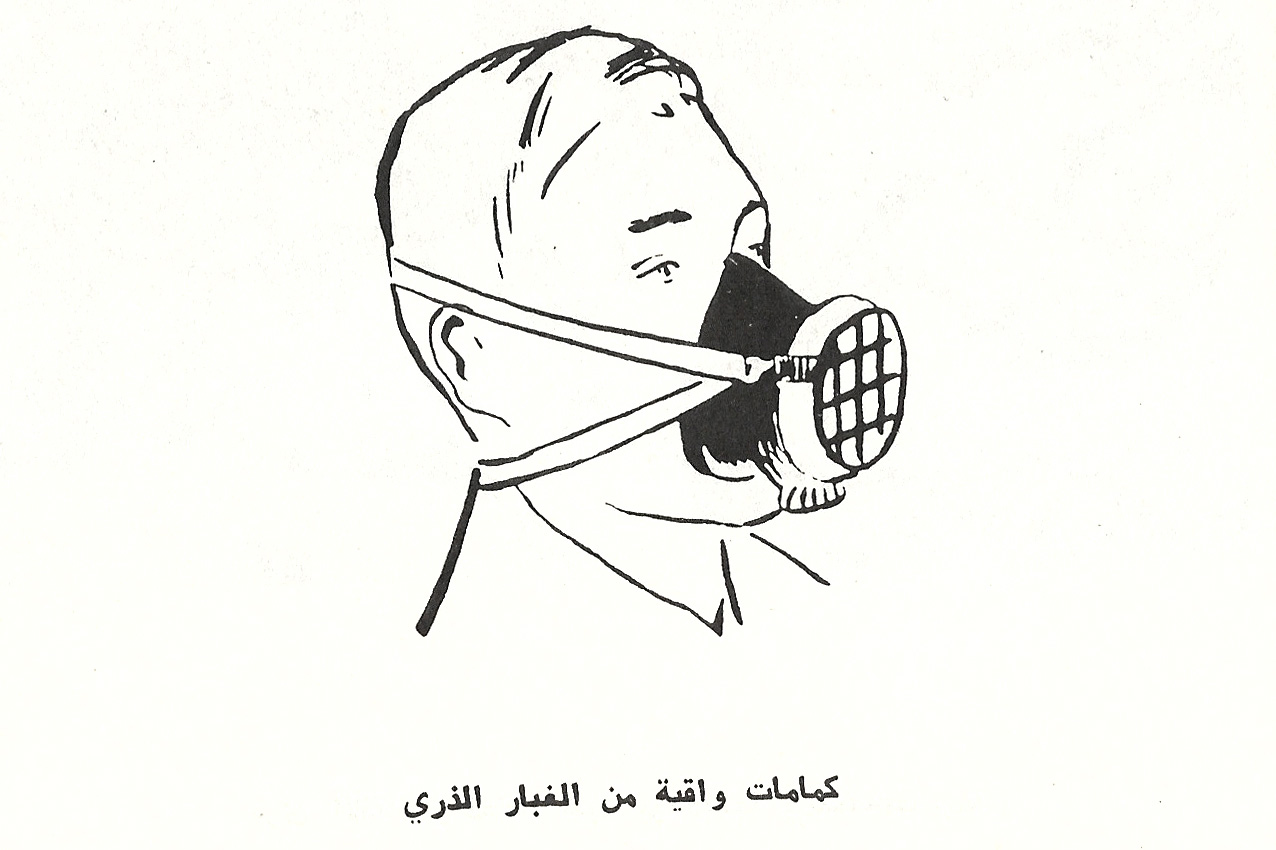
Arabian Humanities: International Journal of Archaeology and Social Sciences in the Arabian Peninsula
The Face Mask: A Desperate Measure
2020
French Center for Archeology and Social Sciences
Arabian Humanities is a journal published by the French Center for Archeology and Social Sciences (CEFAS), renamed the French Center for Research on the Arabian Peninsula (CEFREPA) in 2021. Arabian Humanities is a peer-reviewed, multilingual journal (articles edited and published in French, English and Arabic) that covers, on a biannual basis, all areas of the human sciences, ranging from prehistory to present-day societies. Built around a thematic file, each issue includes various book reviews on the most recent publications on the Arabian Peninsula that appear in European and Arabic languages.
Website: www.journals.openedition.org/cy/5937
The Face Mask: A Desperate Measure
2020
French Center for Archeology and Social Sciences
Arabian Humanities is a journal published by the French Center for Archeology and Social Sciences (CEFAS), renamed the French Center for Research on the Arabian Peninsula (CEFREPA) in 2021. Arabian Humanities is a peer-reviewed, multilingual journal (articles edited and published in French, English and Arabic) that covers, on a biannual basis, all areas of the human sciences, ranging from prehistory to present-day societies. Built around a thematic file, each issue includes various book reviews on the most recent publications on the Arabian Peninsula that appear in European and Arabic languages.
Website: www.journals.openedition.org/cy/5937
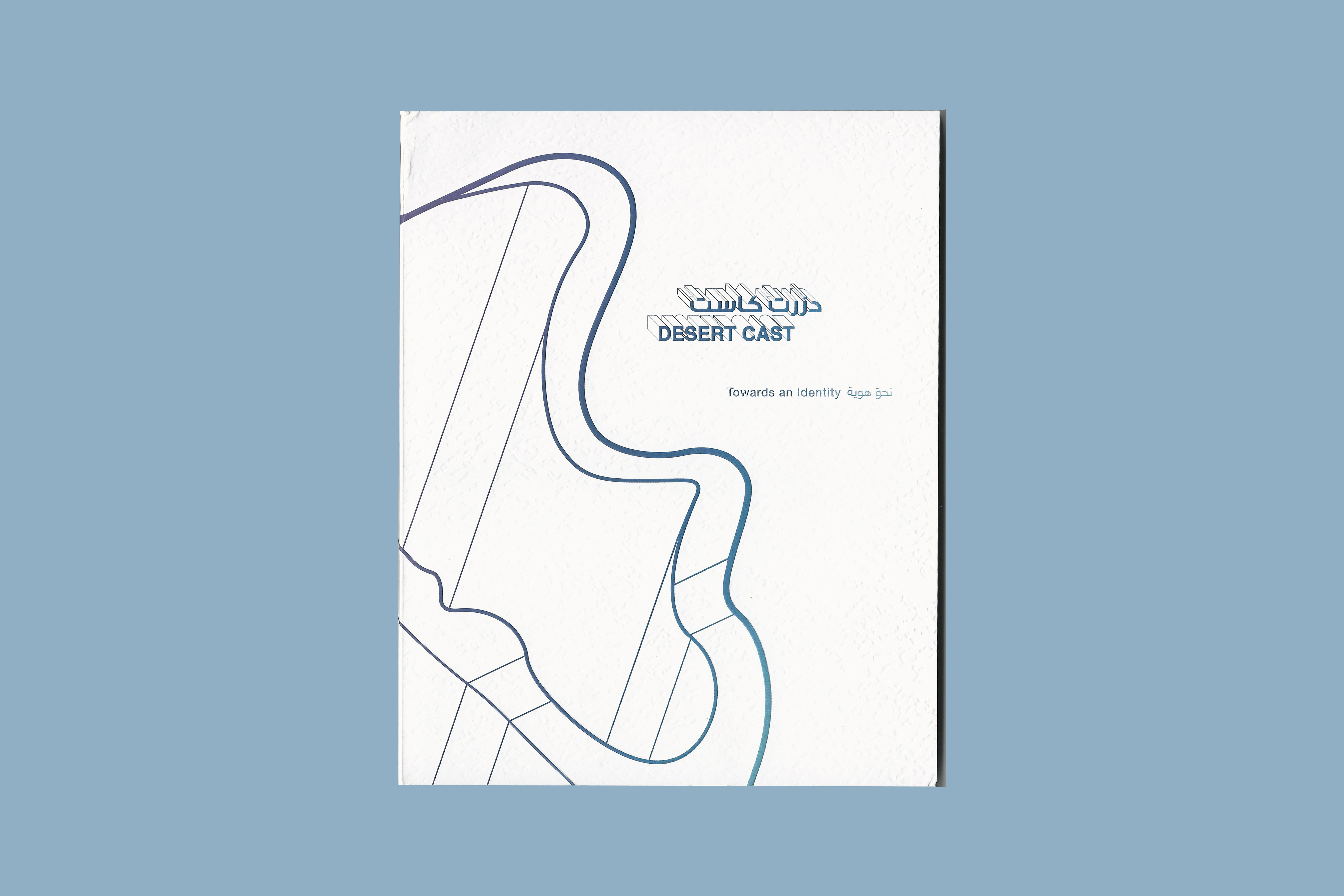
Desert Cast
Imitation, Eclecticism and Ornamentation: Tracing Kuwait’s Obsession with Western Classical Elements
2020
Exhibition Publication Contributor
1971- Design Space presented Desert Cast - Towards an Identity by the Kuwait-based designers Jassim AlNashmi, Kawther AlSaffar and Ricardas Blazukas. Hybridising motifs from the past and present, the series contributed to developing local design identity by re-applicating regional and borrowed elements. The publication documents the fabrication process of the project and its progression with the collaboration, the newly commissioned pieces, the presentation at 1971- Design Space, and essays by experts from the region about the topic of identifying the regional architectural design identity.
Editors
Jassim AlNashmi, Kawthar AlSaffar, Ricardas Blazukas
Website: www.1971design.ae/en/publications/
Imitation, Eclecticism and Ornamentation: Tracing Kuwait’s Obsession with Western Classical Elements
2020
Exhibition Publication Contributor
1971- Design Space presented Desert Cast - Towards an Identity by the Kuwait-based designers Jassim AlNashmi, Kawther AlSaffar and Ricardas Blazukas. Hybridising motifs from the past and present, the series contributed to developing local design identity by re-applicating regional and borrowed elements. The publication documents the fabrication process of the project and its progression with the collaboration, the newly commissioned pieces, the presentation at 1971- Design Space, and essays by experts from the region about the topic of identifying the regional architectural design identity.
Editors
Jassim AlNashmi, Kawthar AlSaffar, Ricardas Blazukas
Website: www.1971design.ae/en/publications/
ⓒ Aseel AlYaqoub, 2024